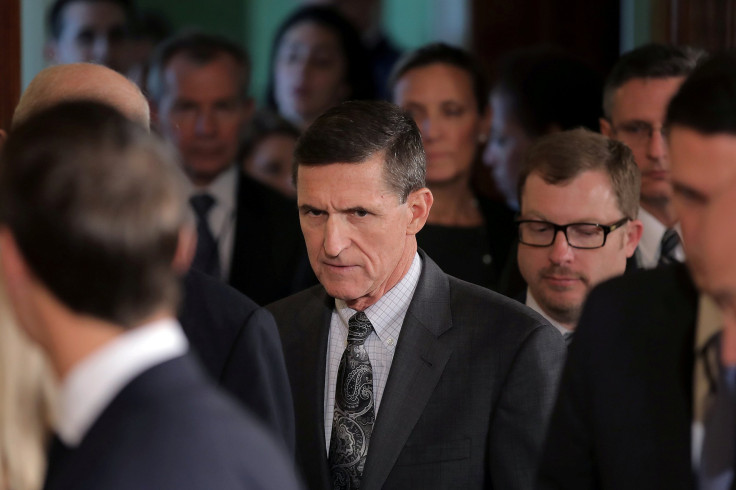Russians Viewed Michael Flynn As A Close Friend, Sources Say While Trump Meets Saudi King In Riyadh

Russian officials boasted during last year's presidential campaign that they had built a strong relationship with former National Security Adviser Michael Flynn. The Russian officials believed that they could use Flynn to influence President Donald Trump and his team, sources told CNN.
The discussions became point of concern for U.S. intelligence officials, who picked up the conversations by the Russians regarding Flynn last year, CNN reported. However, the officials also said Russians might have been exaggerating their hold over Flynn.
This took place at a time when Trump is out for his first official foreign trip to Middle East and Europe. The president and his wife, Melania Trump were greeted Saturday by King Salman at Riyadh, Saudi Arabia, which is the first stop of Trump's first official tour as commander in chief, the BBC reported.
He is reportedly expected to sign multi-billion dollar deals between the U.S. and Saudi Arabia.
Read: Was Michael Flynn FBI Investigation Influenced By Trump?
Back home meanwhile, one of the former officials under Obama administration spoke about these supposed conversations about Flynn: "This was a five-alarm fire from early on." Another former administration official said Flynn was viewed as a threat to national security since the beginning.
Flynn resigned from the top White House post in February amid controversies he had discussed sanctions with Russia's ambassador, Sergey Kislyak, the month before Trump took office and that Flynn had failed to disclose the nature of those conversations with top administration officials.
During the last seven months of the 2016 presidential race, Flynn and other advisers to the Trump campaign were reportedly in contact with Russian officials through phone calls and emails. Current and former U.S. officials familiar with the exchanges told Reuters at least 18 calls and emails were exchanged between Trump and Russian officials.
FBI and congressional investigators, who are now probing into Russian meddling in the U.S. presidential election and contacts between Trump’s campaign and Russia, are reviewing those calls and emails. Six of those previously undisclosed contacts were supposedly phone calls between Kislyak and Trump advisers, including Flynn, Reuters reported citing three current and former officials.
When Flynn was in Trump's transition team, he had told the members Jan. 4, 2017 he was under federal investigation for lobbying on behalf of Turkey and for failing to disclose he was paid to do so, the New York Times reported citing two people familiar with the matter.
The Justice Department informed Flynn about him being under investigation about a month before Flynn told Trump. However, Trump still picked Flynn as the national security adviser. The role of this job was such that Flynn had access to Trump and to almost every secret held by American intelligence agencies.
They knew: The Trump transition team, led by Mike Pence and Don McGahn, were told Mike Flynn was under investigation ... BY Michael Flynn. pic.twitter.com/8a8EZ3m0xE
— Joy-Ann (Pro-Democracy) Reid 😷 (@JoyAnnReid) May 18, 2017
Flynn, who had to leave the post just 24 days in to the job, was initially retained as a adviser even after the acting attorney general, Sally Yates, warned the White House she was worried about Flynn's actual contact with the Russian ambassador. She also warned that Flynn mislead Vice President Mike Pence about the nature of conversations he had had with the Russian ambassador to the U.S.
However, White House officials had maintained Yates merely wanted to give them a "heads-up" about the former national security adviser's Russian contacts.
After Flynn's dismissal, Trump also allegedly tried to persuade former FBI Director, James Comey, to drop the investigation into Flynn's links with Russia. Some legal experts have expressed concern Trump reported actions could be grounds for an investigation of the president for possible obstruction of justice, and even impeachment. Trump fired Comey on May 9.
© Copyright IBTimes 2025. All rights reserved.






















